Telling China's Stories Well: The College of Humanities and Law and the Faculty of Marxism held Seminar on the Curriculum Ideological and Political Education
On June 21, 2024, the College of Humanities and Law and the Faculty of Marxism held seminar on the curriculum ideological and political education successfully in the first conference room of the East Campus Conference Center. This seminar is held in order to fully implement General Secretary Xi Jinping’s important expositions on education and the message delivered from the National Education Conference, thoroughly execute on the fundamental task of molding high morals and cultivating talents, nd to comprehensively promote the construction of curriculum ideological and political education in the College of Humanities and Law with the hope of improving the quality of talent training. Themed with “Telling China’s Story Well”, the teachers attending the seminar shared and discussed the experience of ideological and political curriculum construction for the English major of the School of the College of Humanities and Law.
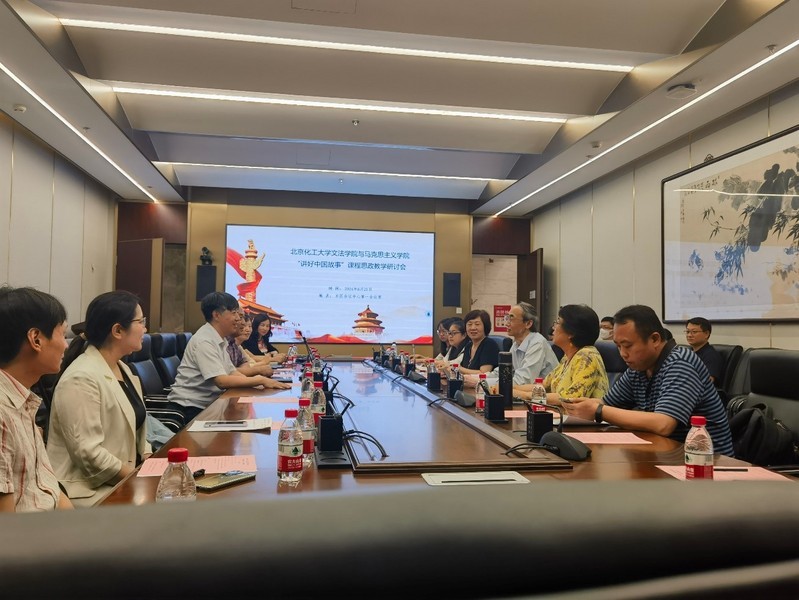
Dean Zhang Jianwei, Secretary of CPC committee Zhang Liang, Vice Dean Xue Changli from the College of Humanities and Law, and Secretary of CPC committee Luo Bing from the Faculty of Marxism attended the seminar. Director Zhang Lirong and her team of the Teaching and Research Office of the Outline of Modern Chinese History from the Faculty of Marxism, heads of all the majors of the College of Humanities and Law, teacher representatives who lectured on the curriculum ideological and political demonstration courses, teachers who won awards for excellent curriculum ideological and political cases, and teachers from the English Department and other departments attended the meeting. Zhang Ju, head of the English Department presided over the seminar.
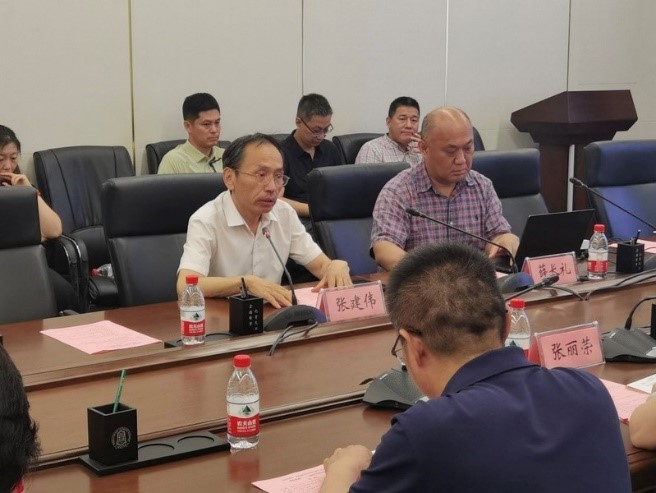
Dean Zhang Jianwei from the College of Humanities and Law delivered an opening speech. On behalf of the College, he welcomed the Faculty of Marxism to participate in the curriculum ideological and political education seminar jointly held by the two colleges. He reviewed the achievements of the two colleges in teaching cooperation and scientific research project cooperation, introduced the recent progress of the curriculum ideological and political work, and pointed out that the English major should highlight the professional characteristics in the construction of curriculum ideological and political education, cultivate foreign language talents that meet the needs of national development in order to better make China’s voice heard on the international stage.
Three teachers from the English major of the College of Humanities and Law shared their teaching ideas and experiences of curriculum ideological and political education by taking the courses they taught as examples.

In his keynote address titled “Cultivating International Communication Talents with Production-Oriented Approach,” Yang Hong elaborated on the organic integration of curriculum objectives and ideological and political goals within the course of “Advanced English Reading (II).” He emphasized that amidst China’s rising comprehensive strength and international influence, the cultivation of foreign language talents should prioritize their abilities to effectively tell China’s stories and disseminate China’s voice globally. The goal is to nurture interdisciplinary talents with a patriotic spirit, global perspectives, and professional competence, thereby contributing to China’s growing international influence and facilitating a deeper understanding of China by the international community. To achieve this, the course of “Advanced English Reading (II)” incorporates three instructional modules: “Analytical Reading,” “Global Perspectives,” and “Discourse with Chinese Characteristics.” These modules aim to enhance students’ critical thinking skills, broaden their international horizons by acquainting them with diverse international evaluations of China’s development path, and foster their ability to articulate China’s unique narratives. Through various forms of output such as multimodal presentations and short videos, students are encouraged to share contemporary China’s achievements and experiences in reform and opening-up, as well as ancient Chinese philosophical thoughts and their contemporary relevance, targeting an international audience. This approach ultimately fulfills the teaching objectives of “telling China’s stories well” and “disseminating Chinese wisdom.”
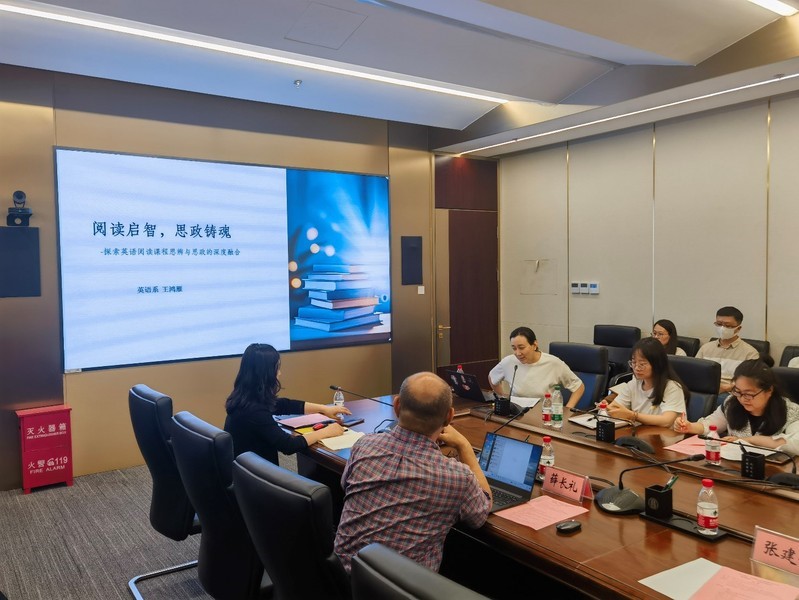
Wang Hongyan, in her keynote speech titled “Wisdom Inspired by Reading, Soul Shaped by Ideological and Political Education: Exploring the Deep Integration of English Major Reading Courses with Ideological and Political Elements,” offered a multifaceted perspective on the significance of deeply integrating critical thinking and ideological and political education. Drawing from the principles of moral education, curriculum ideology and politics, and the “New National Standards” for English majors, she underscored the importance of this integration in nurturing students’ critical thinking abilities and shaping their values, thereby fulfilling the fundamental mission of moral education. In critical reading, Wang Hongyan advocated the use of “skillful questioning” to encourage students to analyze the logic of the text and to tease out its implicit meanings. Integrating elements of ideological and political education into these questions helps foster emotional resonance and value guidance. The complementarity between critical thinking abilities and ideological and political education ensures that the former deepens its effectiveness, while the latter gains value orientation and moral support, the two mutually reinforcing each other to promote students’ holistic development.
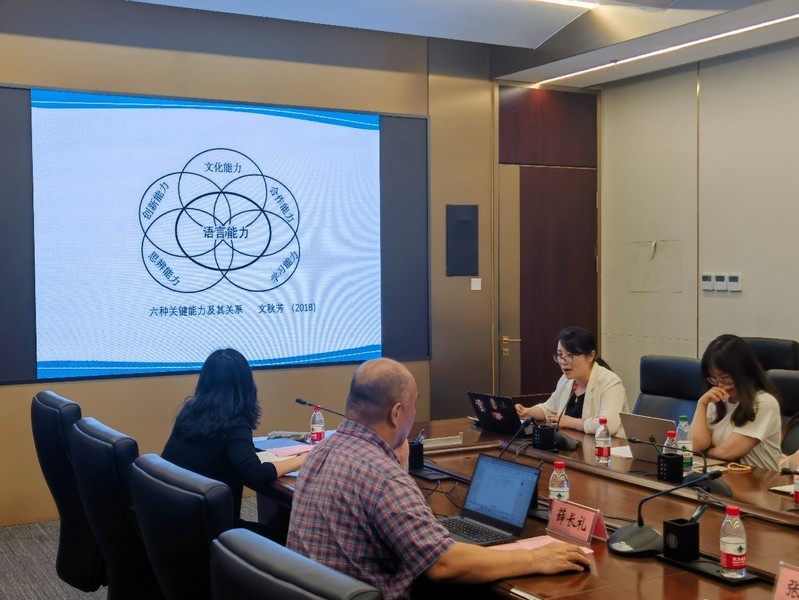
Zhang Jing delivered a keynote speech titled “Understanding Chinese Culture, Spreading China’s Voice – Taking Unit 3 of English Public Speaking as an Example.” She shared her experience in cultivating students’ ability to spread China’s voice, using the unit of “Cultural Confidence” from a textbook of “Three Entries.” Zhang Jing stimulated and enhanced students’ cultural confidence through classroom discussion of Chinese traditional cultural symbols and cultural soft power. She used case studies to guide students to analyze the audience in terms of their attitudes and emotions, as well as the environment, enabling them to better understand their audience, facilitate resonance, and maximize audience benefits, thereby improving speech effectiveness. Zhang Jing emphasized that the teaching of Public Speaking should fully activate students’ existing knowledge and inspire their passion for exploration. She emphasized the importance of integrating reading, writing, speaking, and evaluating in the curriculum, and she encouraged students to seek moving stories of China from people and events around themselves rather than relying on grand narratives.

Representatives from the Teaching and Research Office of the Outline of Modern Chinese History at the School of Marxism commented on the keynote speeches. First, they gave immense praise to the curriculum ideological and political education construction at the College of Humanities and Law, speaking highly of its breadth, depth and professionalism. Then, they suggested that teachers of the English major should continue to explore elements that are both historical and contemporary, both foreign and personal to facilitate their curriculum ideological and political construction. They advised guiding students to tell China’s stories, especially contemporary ones, in ways that are familiar and appealing to the foreign audience.
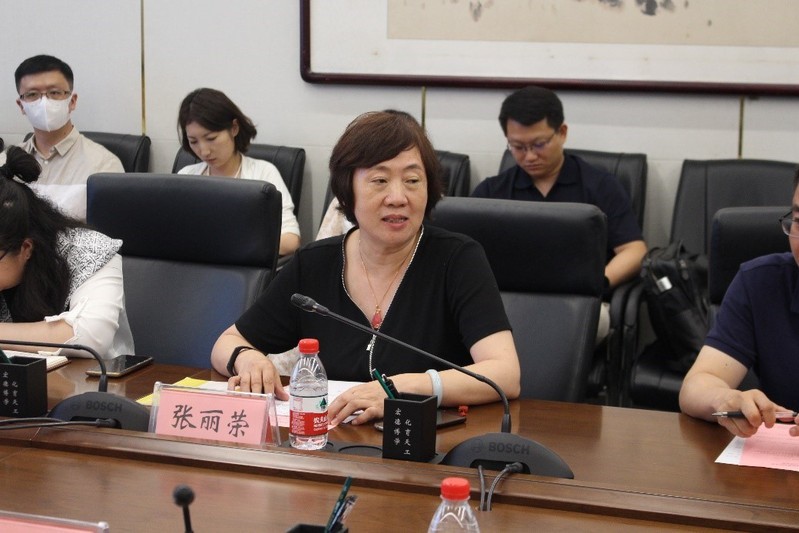
Zhang Lirong, Director of the Teaching and Research Office of the Outline of Modern Chinese History at the School of Marxism, and Zhang Ju, head of the English major at the School of Literature and Law, gave concluding remarks. Director Zhang Lirong congratulated on the successful conclusion of the teaching seminar, noted the high importance the College of Humanities and Law attaches to curriculum ideological and political construction, and thanked the keynote speakers for their excellent presentations, and appreciated detailed comments from teachers of Teaching and Research Office of the Outline of Modern Chinese History. She emphasized the fundamental task of teachers to “stand at the three-foot podium and do well in cultivating people with virtues.” Zhang Ju, head of the English major, thanked the teachers from the School of Marxism for their valuable suggestions, fully affirmed the achievements of teachers of the English major in curriculum ideological and political construction, and expressed the intention to use this seminar as an opportunity to continue deepening cooperation with the School of Marxism.

